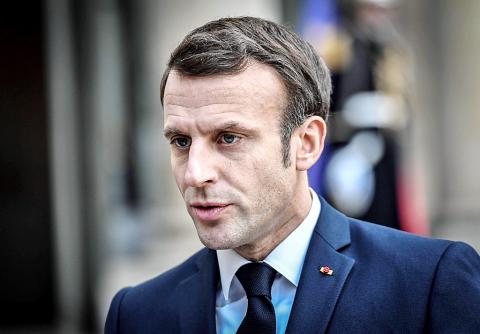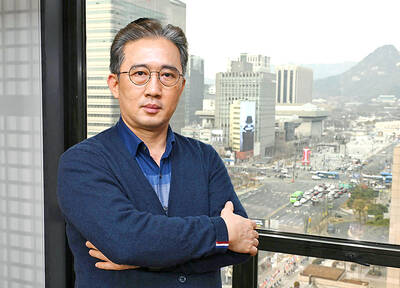France, the EU’s sole nuclear power since Britain’s exit from the bloc, was to unveil how it intends to use its atomic arsenal as a deterrent.
French President Emmanuel Macron, in an address to military officers graduating in Paris yesterday, was expected to recommit to upgrading France’s capacity, at a time when NATO allies, who would ordinarily look to the US in a nuclear standoff, worry about Washington’s retreat from the multilateral stage.
On Monday, Macron said that his speech would address the interests of other European countries.

Photo: AFP
“I will focus on the doctrine [of French deterrence], but also on the procedures and modalities that I wish to propose on this topic to our partners in the coming months,” he said on a visit to Warsaw.
Deterrence theory postulates that countries with nuclear weapons are less likely to attack each other for fear of mutual destruction, meaning the arms serve as guarantors of peace.
France considers nuclear deterrence a keystone of its defense strategy and the ultimate guarantee of its most vital interests.
Macron has already agreed to a costly modernization of France’s atomic arsenal, saying in January 2018 that “deterrence is part of our history, part of our defense strategy, and will remain so.”
An act of parliament provides for about 37 billion euros (US$41 billion) to be spent on the maintenance and modernization of the French nuclear arsenal from 2019 to 2025 — about 12.5 percent of the total defense budget for those seven years.
Macron’s address comes after Russia and the US last year withdrew from the Soviet-era Intermediate Range Nuclear Forces treaty.
Macron in December last year said that the treaty’s end meant that “France, Germany, and other European countries are now threatened by new Russian missiles.”
Washington has also since threatened not to renew the New START treaty with Russia, the last key nuclear deal between the former Cold War foes.
The treaty, which expires this month, obliged both sides to halve their number of strategic nuclear missile launchers and establish a new verification regime.
Corentin Brustlein, research director at the Paris-based French Institute of International Relations, said that Europe has always been a strong focus of France’s nuclear vision.
There had been several French attempts at dialogue with European partners on the topic “that have never succeeded,” Brustlein said.
However, “the balance is shifting, including in countries such as Germany” where public opinion is deeply anti-nuclear and the subject remains largely taboo, but “where we see emerging positions on the level of European strategic ambition that must grow,” he said.
On Monday, a senior member of German Chancellor Angela Merkel’s Christian Democratic Union pleaded for the EU to create its own nuclear deterrence capability.
Germany should “consider cooperation with France regarding nuclear weapons” and “should be prepared to participate in the nuclear deterrent force with its own capabilities and means,” Johann Wadephul said in an interview with the Tagesspiegel daily.

VAGUE: The criteria of the amnesty remain unclear, but it would cover political violence from 1999 to today, and those convicted of murder or drug trafficking would not qualify Venezuelan Acting President Delcy Rodriguez on Friday announced an amnesty bill that could lead to the release of hundreds of prisoners, including opposition leaders, journalists and human rights activists detained for political reasons. The measure had long been sought by the US-backed opposition. It is the latest concession Rodriguez has made since taking the reins of the country on Jan. 3 after the brazen seizure of then-Venezuelan president Nicolas Maduro. Rodriguez told a gathering of justices, magistrates, ministers, military brass and other government leaders that the ruling party-controlled Venezuelan National Assembly would take up the bill with urgency. Rodriguez also announced the shutdown

Chinese President Xi Jinping’s (習近平) purge of his most senior general is driven by his effort to both secure “total control” of his military and root out corruption, US Ambassador to China David Perdue said told Bloomberg Television yesterday. The probe into Zhang Youxia (張又俠), Xi’s second-in-command, announced over the weekend, is a “major development,” Perdue said, citing the family connections the vice chair of China’s apex military commission has with Xi. Chinese authorities said Zhang was being investigated for suspected serious discipline and law violations, without disclosing further details. “I take him at his word that there’s a corruption effort under

China executed 11 people linked to Myanmar criminal gangs, including “key members” of telecom scam operations, state media reported yesterday, as Beijing toughens its response to the sprawling, transnational industry. Fraud compounds where scammers lure Internet users into fake romantic relationships and cryptocurrency investments have flourished across Southeast Asia, including in Myanmar. Initially largely targeting Chinese speakers, the criminal groups behind the compounds have expanded operations into multiple languages to steal from victims around the world. Those conducting the scams are sometimes willing con artists, and other times trafficked foreign nationals forced to work. In the past few years, Beijing has stepped up cooperation

The dramatic US operation that deposed Venezuelan president Nicolas Maduro this month might have left North Korean leader Kim Jong-un feeling he was also vulnerable to “decapitation,” a former Pyongyang envoy to Havana said. Lee Il-kyu — who served as Pyongyang’s political counselor in Cuba from 2019 until 2023 — said that Washington’s lightning extraction in Caracas was a worst-case scenario for his former boss. “Kim must have felt that a so-called decapitation operation is actually possible,” said Lee, who now works for a state-backed think tank in Seoul. North Korea’s leadership has long accused Washington of seeking to remove it from power